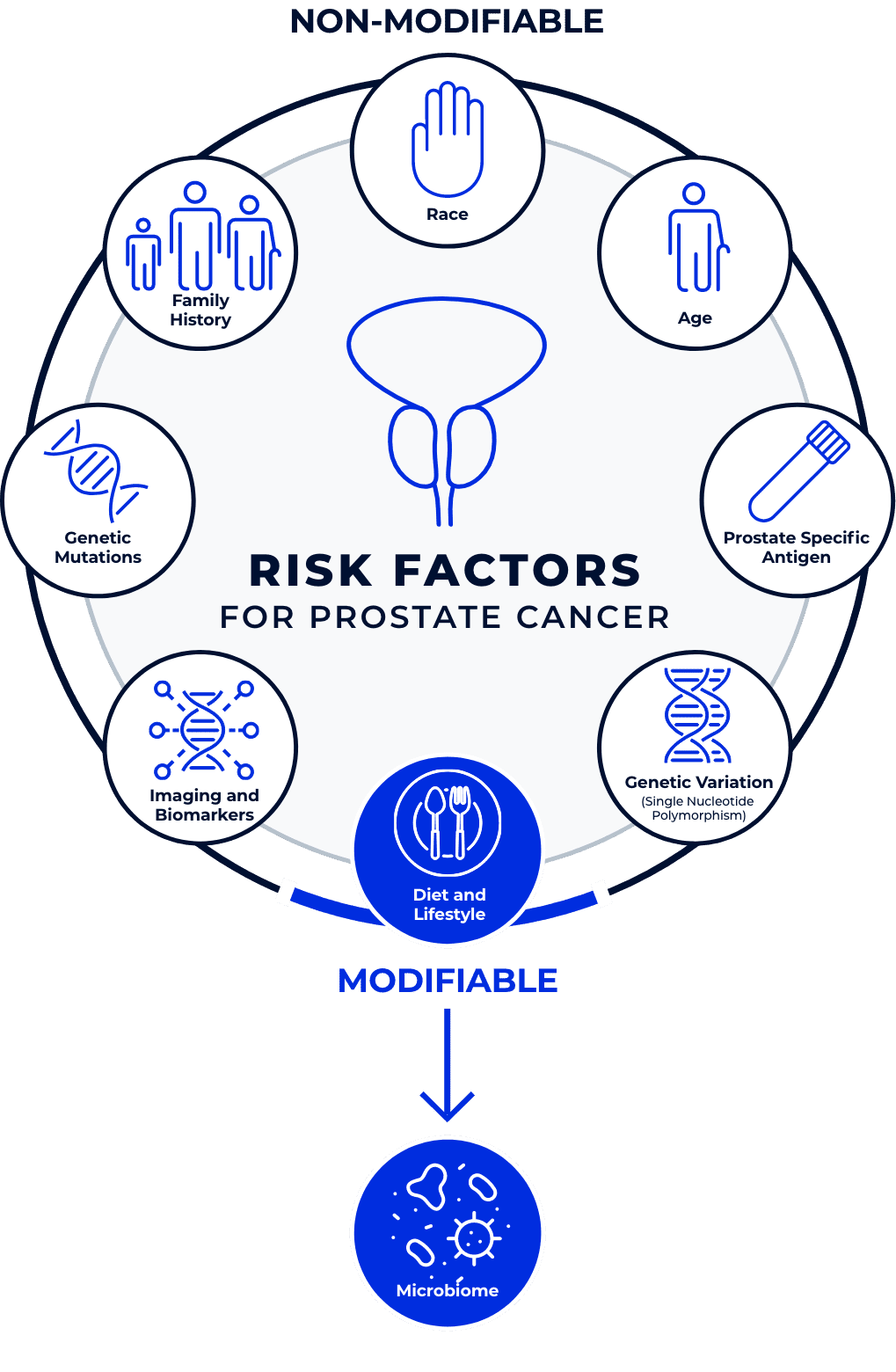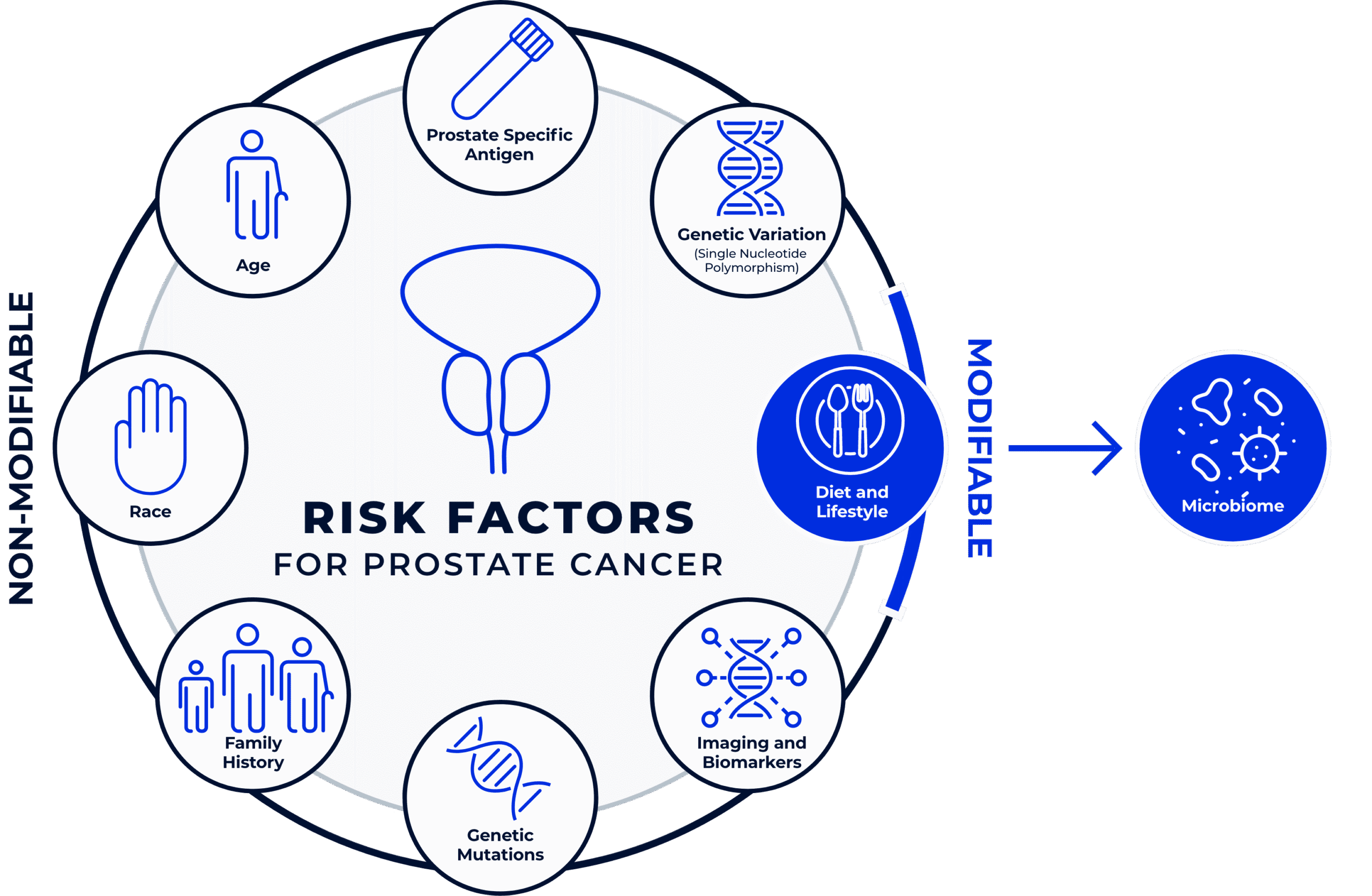PRIMUS: Prostate and Men’s Wellness
1 in 8 men will get prostate cancer
Prostate cancer continues to be the most frequently diagnosed cancer in men, and despite numerous advancements, it remains the second leading cause of cancer-related deaths1. Unhealthy gut microbiota may have a negative impact on your cancer risk.2 Previous research has shown microbiota may cause subtle inflammation starting your colon, leading to immune changes and metabolite production, in turn, influencing your risk of cancer.3,4


- This test is not a substitute for visits to a healthcare professional for recommended screening, and should not be used to determine any treatments or medical interventions.
- The test does not diagnose cancer or any other health conditions and should not be used to make medical decisions.
Primus Microbiome Score
Our findings have shown that men with a score of less than 0.25 have a microbiome profile more similar to those without prostate cancer and those with a score of higher than 0.25 have microbiome profiles more similar to those with a higher risk of prostate cancer.
Top Bacteria Report
Lifestyle Recommendations
Action
Health Index
Probiotics
Food
Supplements
Exercise/Sleep
Interested in learning more?
Get Notified of Updates
We will alert you of any noteworthy news and regulatory approvals.
Until then, we encourage you to sign up for the research study which is voluntary and only for research use but will help bring the test to the market.
References
- Siegel RL , Giaquinto AN , Jemal A . Cancer statistics, 2024. CA Cancer J Clin. 2024; 74(1): 12-49. doi:10.3322/caac.21820
- Zitvogel L, Galluzzi L, Viaud S, Vétizou M, Daillère R, Merad M, Kroemer G. Cancer and the gut microbiota: an unexpected link. Sci Transl Med. 2015 Jan 21;7(271):271ps1. doi: 10.1126/scitranslmed.3010473. PMID: 25609166; PMCID: PMC4690201.
- Liss MA, White JR, Goros M, Gelfond J, Leach R, Johnson-Pais T, Lai Z, Rourke E, Basler J, Ankerst D, Shah DP. Metabolic Biosynthesis Pathways Identified from Fecal Microbiome Associated with Prostate Cancer. Eur Urol. 2018 Nov;74(5):575-582. doi: 10.1016/j.eururo.2018.06.033. Epub 2018 Jul 12. PMID: 30007819; PMCID: PMC6716160.
- Wheeler KM, Liss MA. The Microbiome and Prostate Cancer Risk. Curr Urol Rep. 2019 Sep 7;20(10):66. doi: 10.1007/s11934-019-0922-4. PMID: 31493090.
- Bhatt AP, Redinbo MR, Bultman SJ. The role of the microbiome in cancer development and therapy. CA Cancer J Clin. 2017 Jul 8;67(4):326-344. doi: 10.3322/caac.21398. Epub 2017 May 8. PMID: 28481406; PMCID: PMC5530583.
- Wu G, Xu T, Zhao N, Lam YY, Ding X, Wei D, Fan J, Shi Y, Li X, Li M, Ji S, Wang X, Fu H, Zhang F, Shi Y, Zhang C, Peng Y, Zhao L. A core microbiome signature as an indicator of health. Cell. 2024 Oct 7:S0092-8674(24)01038-9. doi: 10.1016/j.cell.2024.09.019. Epub ahead of print. PMID: 39378879.
- Sosnowski K, Akarapipad P, Yoon J-Y. The future of microbiome analysis: Biosensor methods for big data collection and clinical diagnostics. Med Devices Sens. 2020; 3:e10085. https://doi.org/10.1002/mds3.10085